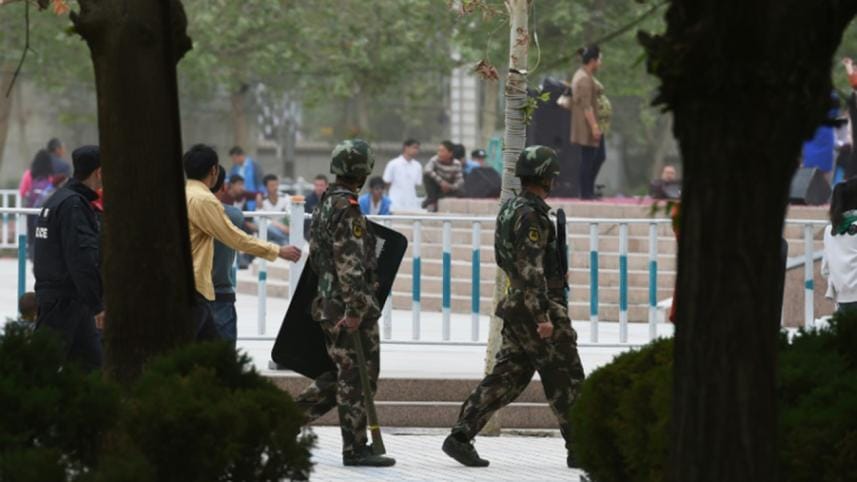28 “terrorists” shot dead in China

Chinese police have killed 28 members of a "terrorist group" in the mainly Muslim Xinjiang region, authorities announced today, in the bloodiest such operation in months and as Beijing denounces Western "double standards" in the wake of the Paris attacks.
The killings took place over the course of a 56-day manhunt following an attack on a colliery in Aksu in September that left 16 people dead, said the Xinjiang regional government's Tianshan web portal. One "thug" surrendered, it added.
It was the first official confirmation of both the attack on the mine and its aftermath.
Xinjiang is the homeland of the mostly Muslim Uighur ethnic minority, many of whom complain of discrimination and controls on their culture and religion, and is often hit by deadly unrest.
The assault on the colliery was "a violent terrorist attack under the direct command of an overseas extremist organisation", Tianshan said.
China's official Xinhua news agency cited a Xinjiang government statement identifying the attack leaders as Musa Tohniyaz and Mamat Aysa, both apparently Uighur names.
Friday's reports came after Radio Free Asia (RFA), which is funded by the US government, said that more than 50 people including five police were killed in a knife attack at a colliery in Aksu in September.
The assailants targeted security guards, the mine owner's house, and a workers' dormitory, it said.
Earlier this week RFA cited government and local sources as saying 17 suspects, including seven women and children -- among them a one-year-old and six-year-old -- had been killed by authorities.
- 'Victim of terrorism' -
Beijing regularly accuses what it says are exiled Uighur separatist groups such as the East Turkestan Islamic Movement of being behind attacks in Xinjiang, which has seen a wave of deadly unrest.

Rights groups and overseas Uighur organisations say that such actions are among the drivers of the violence.
"China uses extremely repressive means to deal with Uighurs dissatisfied with government policies," Dilxat Raxit of the World Uyghur Congress exile group told AFP in an email.
"Beijing is shirking responsibility that its own policies caused (the mine attack) by saying so-called foreign forces were in command."
Beijing -- which considers condemnations of attacks in Xinjiang by foreign governments as weak -- slammed Western countries for applying "double standards" on terrorism in the wake of the Paris attacks that left at least 129 people dead.
"Double standards shouldn't be allowed," Chinese Foreign Minister Wang Yi said Sunday.
"China is a victim of terrorism," Xinhua said in a commentary late Thursday.
"Combating the East Turkestan Islamic Movement (ETIM), a UN-listed terror group, and other terrorist groups is an important component of the international fight against terrorism," it added.
China tends to reserve the "terrorist" label for attacks involving Uighurs.
Last month police quickly ruled out the possibility of a "terrorist act" when a series of 18 explosions killed at least seven people in the southern region of Guangxi.
The word was similarly avoided when a bomb explosion killed one person and injured eight outside a Communist Party office in Shanxi province in 2013.
- Gun battles -
The Tianshan portal said police mobilised around 10,000 people of "various ethnic groups" to help in the search for the coal mine attackers.
Pictures showed farmers armed with wooden batons and farm tools, and a helicopter that was also deployed in the operation.
The "mobsters" were shot dead during several gun battles, the last of them on November 12, it said.
Authorities launched a "strike hard" campaign in Xinjiang after a bomb rocked the main train station in the regional capital Urumqi last year as President Xi Jinping was wrapping up a visit to the city.
The crackdown has seen mass trials and multiple executions.
In March 2014, 31 people were knifed to death at a train station in Kunming, in southwestern China, with four attackers killed, with Xinjiang separatists blamed and state media dubbing it "China's 9/11".
Two months later 39 people were killed in a bloody market attack in Urumqi.



 For all latest news, follow The Daily Star's Google News channel.
For all latest news, follow The Daily Star's Google News channel.
Comments